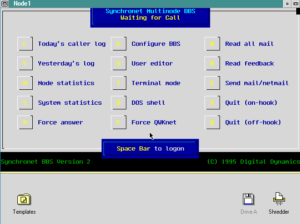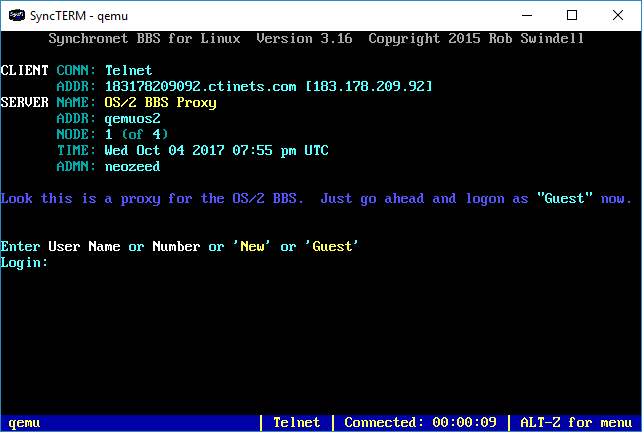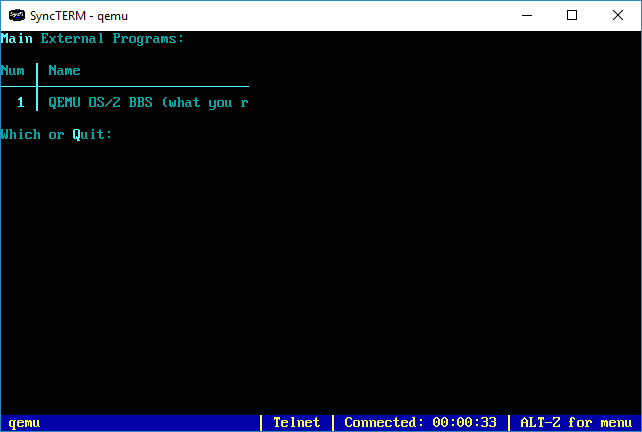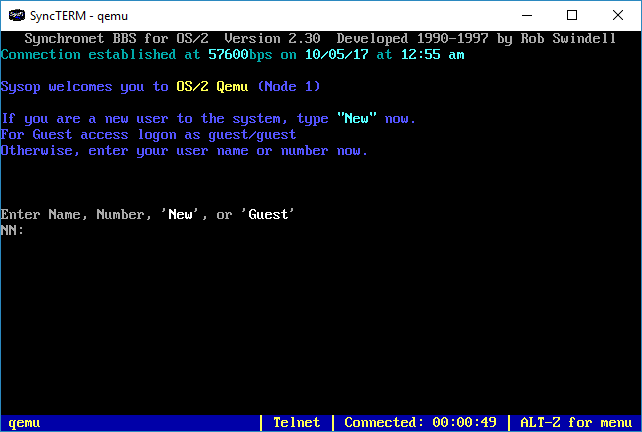I still run an ancient BBS, using Synchronet on OS/2. The problem being that I not only get port scanned an incredible amount of times, but so many things out there now logon as root/root and they think they are on a Linux machine and can then shell script their way into some exploits. Ive tried rate limiting, and other methods, but I end up with so many distributed connections that SIO can’t cope and it’ll crash. A reboot will fix it, of course, but rebooting 2-3 times a day is a bummer. So I thought I’d front my BBS with a stub BBS, which means building Synchronet from source. And while there is some guides on how to do this, I naturally hit some weird undocumented error.
So yeah, get ready for this fun error:
jsapi.cpp: In function ‘JSIdArray* JS_Enumerate(JSContext*, JSObject*)’:
jsapi.cpp:3988:16: error: cannot convert ‘bool’ to ‘JSIdArray*’ in return
return false;
So it turns out that GCC 6 and higher won’t compile the older javascript engine that Synchronet relies on. Ok, so I figured I would just fix the cast and go on my way. But no, as part of the build process once it figures out that I’ve tampered with a file it’ll re-unpack the engine and break on the same error again. And this is why I find things that try to be so ‘easy’ and holding (I’m looking at you Cmake!!!!) end up being totally black box, and absolutely useless.
So what I really need is g++ 4.x, and what is the quickest and easiest way to get the old compiler? Ugh, grab the package from the prior version Jessie. Seriously. Add this into your /etc/apt/sources.list
deb http://ftp.us.debian.org/debian/ jessie main contrib non-free
and then run:
apt-get update && apt-get install g++-4.9
And take the new line out of /etc/apt/sources.list or you will have hell to pay.
After that it was a matter of modifying some of the logon code to streamline the logon process, and to gut the ‘ham radio’ door into something that’ll telnet to the OS/2 BBS. After a bit of work it actually works. I even tested Zmodem, and that works too!
I need some ASCII art or something. That and probably turn off new user registration. Guest access is all anyone can get on the proxy.
I could probably do more here. Years ago I ran some public access Ancient UNIX stuff, but the problems were that it got slammed from the internet. But if Synchronet can keep up with the idiots on the outside, I guess this works as a jump point into something else? I may have to see about adding some 386BSD, and Linux 1.0
And here we are, at the old BBS. I never got that many people to begin with, and I did like having the only OS/2 BBS on the internet up. The other BBS O-Zone seems to have given up, as their domain expired. So it’s just me, once more again.
I’m sure the vast majority of people won’t care, but I guess I finally hit the tipping point where 1996’s SIO just can’t keep up in 2017’s world of relentless port knocking.





to invoke Steve Brule: just chrange out the JavaScript engine, ya turkey!
I can never tell is Brule supposed to be retarded, drunk, high, or maybe all of the above? We’re not ready….
Instead of installing packages from older versions of your distro, did you consider installing (some of) the older version of your distro in a chroot? I don’t use Debian much, but I’ve used schroot, and https://wiki.debian.org/Schroot recommends that you can use some tool called debootstrap to do the Debian “install”. Then e.g.:
schroot -c jessie — make -j
assuming you called your chroot “jessie” and set up schroot’s fstab to mount your current working directory in the same place in the chroot.
I find this a nice solution for running older distributions which is much more lightweight than VMs and even lighter than Linux Containers.
If I was really smart, I’d use UML or, yeah a jail thing. But I’m impatient. Usually I have a ‘compiling’ VM around with all the tools but I haven’t maintained that stuff since Debian 7, which was forever ago now…